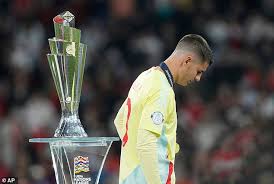June 24 – There’s something deeply disturbing about a 19-year-old sitting behind a screen in Málaga, typing death threats to Álvaro Morata and his family because of a penalty miss. Not disappointment, not frustration – death threats.
Morata has given everything for his country, who captained Spain to Euro 2024 glory and the 2023 Nations League title, who has scored 37 goals in 86 appearances wearing the red shirt with pride.
The arrest of this young man following Spain’s penalty shootout defeat to Portugal in the Nations League final should force Spanish football to confront an uncomfortable truth: there’s a fan problem in the game that instead of disappearing is growing stronger.
Earlier this month, four men received sentences for racially abusing Vinicius Jr – the first criminal convictions for racist abuse in a Spanish football. That landmark case was supposed to be a watershed moment, a signal that Spanish football was finally ready to confront its demons. Yet here we are again, with another young Spaniard so consumed by football-related hatred that he made an online threat to a national hero and his family.
The pattern is becoming impossible to ignore. The Vinicius case revealed the systematic nature of racist abuse in Spanish football, with chants, banners, and organized hatred that had been tolerated for far too long. Now we see that this culture of acceptable toxicity extends beyond racism into something even more sinister – the normalization of threatening violence against players and their families for sporting failures.
Morata’s wife, Alice Campello, was forced to share the hateful messages they received. The fact that she felt compelled to make this public speaks to the desperation.
The perpetrator’s initial response tells us everything about this toxic culture. He reported his account as “hacked” – not because he was ashamed of the threats, but because he feared consequences. Only when cyber agents exposed his lies did he confess, and even then, we can assume it was reluctantly.
“The inconsistencies in the complainant’s statement, who was seeking an alibi to cover up the fact that he was the author of the comments, as well as other checks carried out by cyber agents, ended up incriminating the suspect, who admitted to the facts,” the police statement reads like a case study in how football hatred has become so normalized that perpetrators expect to escape consequences.
But here’s what makes this case particularly tragic: Morata’s response to missing the penalty was everything we should want from a footballer. “I feel bad for my teammates, but it’s part of life. The penalty? I didn’t take it well, I could have done better, but there’s nothing I can do now.” This is a man taking responsibility, showing humility, demonstrating the kind of character that should be celebrated, not threatened.
Instead, the abuse has driven him to question his international future. “It’s possible I won’t be back in September,” he said after the game, and who can blame him? When representing your country results in death threats against your family, when can the cost become too high?
This is where Spanish football needs to ask itself some serious questions. The Vinicius Jr. case showed us that racism had become so embedded in Spanish football culture that it took criminal convictions to generate meaningful change. The Morata case suggests the problem runs even deeper – this isn’t just about prejudice against foreign players or racial minorities; this is about a fundamental breakdown in how Spanish football culture processes disappointment and failure.
Spanish football has spent years pointing to its technical excellence, its tactical sophistication, its development of world-class talent. But what good is producing the best players in the world if the culture surrounding the game drives them away? What is the point of winning tournaments if your own fans threaten to kill you for missing penalties?
The four men sentenced for abusing Vinicius Jr. hopefully represented a turning point – Spanish justice finally taking football-related hatred seriously. The arrest in Málaga represents another test. Will Spanish football use this moment to examine the culture that creates these perpetrators, or will it treat this as another isolated incident to be forgotten once the news cycle moves on?
Contact the writer of this story at moc.l1750849849labto1750849849ofdlr1750849849owedi1750849849sni@o1750849849fni1750849849

